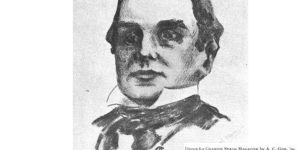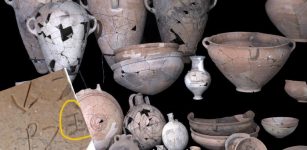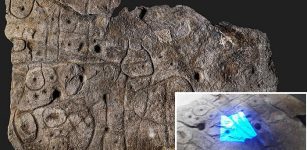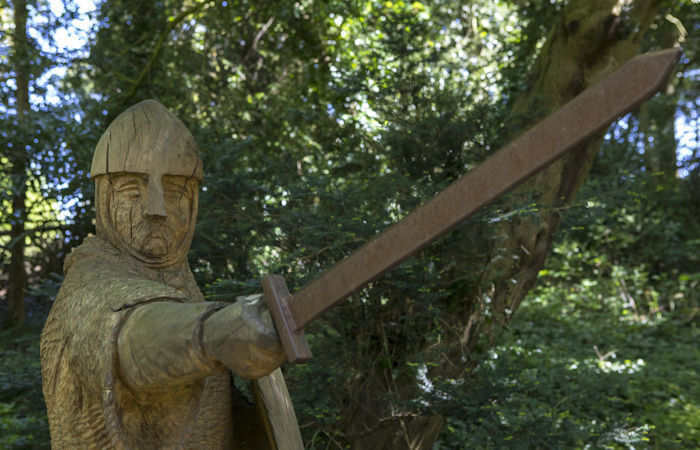Penda – The Pagan King Who Converted The Kingdom Of Mercia To Christianity
Ellen Lloyd - AncientPages.com - It is often said the conquerors write history, which may be true in the case of King Penda.
The early history of the ancient kingdom of Mercia is difficult to trace due to the lack of surviving historical sources. Some early works, but scholars complain these old accounts are unobjective, filled with misquotes, and sometimes deliberately manipulated to present a more vivid story.
Credit: Adobe Stock - chrisdorney
This fact explains why many missing pieces could have shed more light on the ancient history of the King of Penda, the first ruler of Mercia.
In the same way, Aethelflaed, "Iron Lady Of Mercia," courageously fought for her kingdom, King Penda did all he could for his kingdom.
In the case of King Penda (Peada), one can gain a fair amount of information about the ruler and his sons from the Anglo-Saxon Chronicles written in the late 9th century.
Sources for the early history of England are sparse, and the Anglo-Saxon Chronicle is the primary document most historians examine. "A couple of generations before the unification of all England, the country was divided into several minor or smaller kingdoms who each had their king. One of the main kingdoms at that time was Mercia." 1
Bede (also known as Saint Bede, The Venerable Bede) disliked Penda and considered him an enemy and Pagan. The fact remains it was Penda who laid the foundation for Mercian Supremacy and converted the Kingdom of Mercia into Christianity.
Born around 606, Penda rose to power by defeating Northumbrian king Edwin at the Battle of Hatfield Chase in 633. He conquered his enemies and eventually became the most powerful Anglo-Saxon ruler of the time. Edwin's eventual successor, Oswald, was nine years later at the Battle of Maserfield.
"King Penda simply fought against the expanding power of the English Kingdom of Northumbria. Penda's main ally in this struggle was a very powerful British ruler, Cadwallon, king of Gwynedd." 2
King Penda as portrayed in sculpture at Lichfield Cathedral. Credit: Sjwells53 - CC BY-SA 3.0
"The source of conflict between Mercia and East Anglia was presumably control of the East Midland peoples known … as the Middle Angles.' It seems as if there may have been rising tension between the East Anglians and the Mercians. The Life of St Foillan records an attack on East Anglia around the year 650, during which a monastery was destroyed. A second attack 'brought about Anna's death and was the turning point of Penda's career, 'one of the few East Anglian events to make it into the ASC.'53" 3
Anna [or Onna] was king of East Anglia from the early 640s until he died in 653. A.D.
We learn that King Penda hurried to declare Mercia's independence from a Northumbrian overlordship.
There is contradicting information regarding Penda's religious views, but many sources say he remained a Pagan throughout his life. However, through his marriage to Cunewise, many children were born, and the whole family was Christian.
The dark image Bede painted of King Penda illustrates him as an evil man "driven to acts of violence purely because he was a pagan. 'The paganism of Penda was important to the Church ... His role in Church Historiography was negative but vital.' 30 But Penda was not against Christianity per se; Bede tells us that he allowed Christian missionaries to preach in his lands and that his only objection was when Christians scorned to obey the God in whom they believed." 3
Yet, despite being a Pagan, King Panda introduced Christianity into Middle Anglia.
As explained by Bede, King Penda tolerated the preaching of Christianity in Mercia, despite his own beliefs.
"Nor did King Penda obstruct the preaching of the word among his people, the Mercians, if any were willing to hear it; but, on the contrary, he hated and despised those whom he perceived not to perform the works of faith when they had once received the faith, saying, "They were contemptible and wretched who did not obey their God, in whom they believed." This was begun two years before the death of King Penda." 4
Though King Penda is credited with introducing Christianity into Mercia, one of his most significant accomplishments was perhaps his opposition to the supremacy of the Northumbrians.
In 655 A.D., during the Battle of the Winwaed, King Penda's army and the forces of Oswiu of Bernicia encountered each other. Mercia was defeated, and king Penda lost his life. Bede stated the death of King Penda also marked the demise of Anglo-Saxon paganism.
The exact length of King Penda's reign is still disputed, but most historians agree he ruled for about 30 years.
King Penda was succeeded by his son Peada.
Updated on January 30, 2023
Written by Ellen Lloyd – AncientPages.com
Copyright © AncientPages.com All rights reserved. This material may not be published, broadcast, rewritten or redistributed in whole or part without the express written permission of AncientPages.com
Expand for references- David Tee - King Offa Of Mercia And The Murder Of King Ethelbert – Revenge Or Jealousy? AncientPages.com
- Pace, E. (2012). Geoffrey's "Very Old Book" and Penda of Mercia. Arthuriana, 22(2), 53–74.
- Whitehead, Annie - Mercia: The Rise and Fall of a Kingdom
- Bede, Ecclesiastical History of the English People, Book II, XXI
More From Ancient Pages
-
 11th-Century Pratihara-Era Temple Accidentally Found By A Farmer In Uttar Pradesh, India
Archaeology | Aug 6, 2020
11th-Century Pratihara-Era Temple Accidentally Found By A Farmer In Uttar Pradesh, India
Archaeology | Aug 6, 2020 -
 How Did Climate Change Impact European Ice Age Humans?
Earth Changes | Aug 21, 2024
How Did Climate Change Impact European Ice Age Humans?
Earth Changes | Aug 21, 2024 -
 Unusual Skeletons And Mysterious Ancient Artifacts Covered With Unknown Characters Discovered In West Virginia By Archaeologists
Featured Stories | Feb 22, 2024
Unusual Skeletons And Mysterious Ancient Artifacts Covered With Unknown Characters Discovered In West Virginia By Archaeologists
Featured Stories | Feb 22, 2024 -
 5 Fascinating Sacred And Lost Places In Myths And Legends
Featured Stories | May 31, 2016
5 Fascinating Sacred And Lost Places In Myths And Legends
Featured Stories | May 31, 2016 -
 On This Day In History: Courageous And Heroic Radio Rescue At Sea – On Jan 23, 1909
News | Jan 23, 2017
On This Day In History: Courageous And Heroic Radio Rescue At Sea – On Jan 23, 1909
News | Jan 23, 2017 -
 On This Day In History: Samuel Morey Patents The Internal Combustion Engine – On April 1, 1826
News | Apr 1, 2017
On This Day In History: Samuel Morey Patents The Internal Combustion Engine – On April 1, 1826
News | Apr 1, 2017 -
 ‘Giant’ Ant Fossil Raises Questions About Ancient Arctic Migrations
Fossils | Mar 8, 2023
‘Giant’ Ant Fossil Raises Questions About Ancient Arctic Migrations
Fossils | Mar 8, 2023 -
 On This Day In History: 150 Highly-Trained Swiss Guards Entered Vatican For The First Time – On Jan 22, 1506
News | Jan 22, 2017
On This Day In History: 150 Highly-Trained Swiss Guards Entered Vatican For The First Time – On Jan 22, 1506
News | Jan 22, 2017 -
 Soap Was Invented In 2800 B.C By Babylonians
Ancient History Facts | Jun 17, 2016
Soap Was Invented In 2800 B.C By Babylonians
Ancient History Facts | Jun 17, 2016 -
 Ancient Secrets Of Mistletoe – Sacred Celtic Plant With Magical Powers
Ancient Traditions And Customs | Dec 17, 2024
Ancient Secrets Of Mistletoe – Sacred Celtic Plant With Magical Powers
Ancient Traditions And Customs | Dec 17, 2024 -
 Ancient History Of Body Modification In Mesoamerica Practiced By The Aztecs, Maya And Olmecs
Ancient Traditions And Customs | Jul 12, 2017
Ancient History Of Body Modification In Mesoamerica Practiced By The Aztecs, Maya And Olmecs
Ancient Traditions And Customs | Jul 12, 2017 -
 Advent: Facts And History About The Christian Season Celebration
Christmas Traditions | Dec 1, 2024
Advent: Facts And History About The Christian Season Celebration
Christmas Traditions | Dec 1, 2024 -
 New Discovery: Unknown Use Of Yellow Colors In Ancient Egypt – Revealed
Archaeology | Oct 16, 2019
New Discovery: Unknown Use Of Yellow Colors In Ancient Egypt – Revealed
Archaeology | Oct 16, 2019 -
 Spectacular Victory Tower Dedicated To Hindu God Vishnu And Pioneered By King Rana Kumbha
Featured Stories | Apr 25, 2021
Spectacular Victory Tower Dedicated To Hindu God Vishnu And Pioneered By King Rana Kumbha
Featured Stories | Apr 25, 2021 -
 10 Christian Symbols Explained
Ancient Symbols | Jul 28, 2018
10 Christian Symbols Explained
Ancient Symbols | Jul 28, 2018 -
 Canaanite Temple Dated To 12th Century BC Unearthed At Lachish, Israel
Archaeology | Feb 19, 2020
Canaanite Temple Dated To 12th Century BC Unearthed At Lachish, Israel
Archaeology | Feb 19, 2020 -
 The Navajo People In The Land Of The Four Sacred Mountains
Civilizations | Jun 10, 2020
The Navajo People In The Land Of The Four Sacred Mountains
Civilizations | Jun 10, 2020 -
 How Extensively Did Early Farmers Utilize Europe’s Rich Forests For Raising Their Livestock?
Archaeology | Nov 13, 2024
How Extensively Did Early Farmers Utilize Europe’s Rich Forests For Raising Their Livestock?
Archaeology | Nov 13, 2024 -
 Large Bronze Age Stone May Be Europe’s Oldest 3D Map
Archaeology | Apr 8, 2021
Large Bronze Age Stone May Be Europe’s Oldest 3D Map
Archaeology | Apr 8, 2021 -
 On This Day In History: Greek Archaeologist Manolis Andronikos Who Discovered Tomb of Philip II of Macedon, Was Born – On Oct 23, 1919
News | Oct 23, 2016
On This Day In History: Greek Archaeologist Manolis Andronikos Who Discovered Tomb of Philip II of Macedon, Was Born – On Oct 23, 1919
News | Oct 23, 2016


